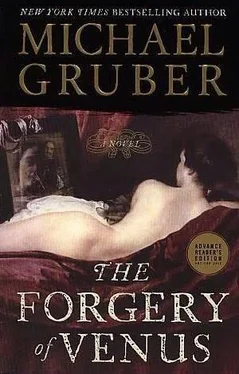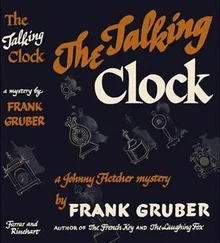She was a singer, or wanted to be; she went to Skidmore, she was on a junior year abroad taking lessons at the Paris Conservatory, and she’d hopped the train down here for a long weekend. I took her through the museum, talking nonstop like some kind of nutcase; I thought she would disappear if I shut up. We were there until it closed, and afterward we went to a little bar I like on Calle de Cervantes and drank wine and talked until it got dark and it was time for tapas, and we ate and drank some more. We closed the place and I walked her back to her hotel by the Plaza Santa Ana, very respectable, and I kissed her there in the doorway, getting dirty looks from a couple of Guardia Civils-no public kissing allowed, Franco didn’t like it-and I thought, This wasn’t supposed to happen, I wasn’t set up for this, love or whatever it is. Crazy.
Ispent the next couple of days with her, every minute. She talked a blue streak, funny as hell, jokes about everything, wandering around the city. She made up a fantasy about us being in a war movie because of the soldiers in the Nazi helmets marching around everywhere-we’re hiding from the Nazis!-and it started to get real, it’s hard to explain. But the next night after we closed the tapas place again, and back at her hotel, I kissed her like before, but longer, and when I said good night like a dope, she grabbed my belt buckle and dragged me inside and up the stairs.
So, that was it, all the stuff the movies teach us about passion, all those scenes where the actors tear their clothes off standing up and the actress jumps up and impales herself on his dick, we’re supposed to believe, and they fall on the narrow bed. I always thought I was a cool guy, in control, but this was a whole different kind of thing. I lasted about two minutes, and I was opening my mouth to apologize but she wouldn’t stop, she told me what to do, she worked on me with her hands and her mouth, and all the time she kept talking, telling me just what she was feeling; I never heard a girl say stuff like that, I couldn’t believe it was happening. “Insatiable” is probably not the right word, I don’t know what the right word is, but we did it until we were raw, we would’ve started hemorrhaging if we hadn’t fallen asleep. And laughing, giggling. I remember thinking, This is too good, there’s got to be something wrong with this, some punishment to come.
We stayed in bed almost all the next day. I staggered out for food and beer once, and then when night fell we got up and cleaned ourselves off, sneaking down the hall to the bathroom together and doing it again under the weak stream of the shower in the tin stall. We went out late like the Spaniards do and she knew clubs-this was all underground stuff, she had addresses from musician friends of hers-and there were kids there playing music. They had no records; rock and roll was banned by the government, so all they knew was what they could pick up on shortwave from the U.S. Armed Forces Radio, and they’d invented their own version, a weird combination of flamenco and Hendrix, incredible music. And I had my drawing stuff and I just drew like crazy, making portraits of the musicians, and her, of course, blazing away on a homemade electric guitar, drawing in ink and putting the gray tones in with spit and wine, ripping the sheets off and handing them out to anyone who wanted them. I thought, Okay, it doesn’t get any better than this, this is life.
When she had to go back to Paris, I went with her. She said we’ll always have Madrid, like in that movie, and so now we have Paris too. I have to say a huge relief leaving fascism behind, it was getting old, that sense of people taking down what you were doing, and the Guardias in their shiny hats on every corner giving you the eye like you’re thinking about bringing down the state.
We stayed in her place off the Rue Saint-Jacques near the Schola Cantorum, third-floor walk-up, filthy bath down the hall. Her room was incredibly messy; I was the fascist in the relationship. She took voice classes at the Cantorum every morning, not the Conservatory, or maybe I got it wrong. La vie bohème, left bank, student demos, everyone in black, pretentious, smoking and drinking and doping like mad. While she was out I hit the museums and the galleries. Paris was dead as far as painting went at the time, all political shit and wannabe New York School.
But I went to an exhibition at the Orangerie, it was Weimar art: Dix, Grosz, and some people I never heard of before, like Christian Schad, Karl Hubbuch. Some terrific stuff, the style was called Neue Sachlichkeit , New Objectivity. So these guys were in the ruins of Germany after the first war and everywhere abstract modernism was the thing to be doing-Picasso, Braque-and there was Dada and Futurism cranking up, and these guys tried to rescue representational art from kitsch and they did it, especially Schad, a technique like Cranach’s, wonderful depth and structure, and shocking penetration. Look at the world you made, you bastards, this is what it looks like. I recall thinking, Can we do that now? Would anyone be able to see it? Probably not, and the world hasn’t changed that much, except we stick the war-wounded behind the walls of hospitals so we don’t have to look at them, and the rich are now thin instead of fat. But even if you did it, the rich shits would buy them up: oh, you have a Wilmot, appreciating very nicely, thank you, not as much as de Kooning but a good return on investment. Everyone is blind now, except if it’s on TV.
Iwas going to stay in Europe for at least a year, but I came home that fall, to find some interesting developments. Mother had been moved to a care facility because of her worsening diabetes and the effects of the new stroke, which is probably a good thing considering more parts of her were turning black and falling off, and no one wants that around the house. They had to take the door off her room, and the frame too, and move her out through the French windows and the garden. My prayer is she had no brains left at the time. She loved that garden.
The wreckage from this demolition was still apparent when I returned, but Dad seemed disinclined to do much about it. Charlie left the day after Mother did, off to her novitiate somewhere in Missouri. She was going to be a missionary sister and help the far-off poor. She didn’t write or leave a note for me; I mean, I knew she was talking about, it but I didn’t think she was just going to leave, like sneaking off while I was gone. I used to tell her when she first started to get serious about it, I told her, you don’t have to do this, Charlie, we can run away together, we can make a life, but she just looked at me in a kind of holy blank way she’s developed and said, it’s not that, Christ was calling her and so on, and I didn’t believe her. She was never that religious when we were growing up; I always thought it was a girl thing, like being crazy about horses. For a while I thought it was because he did something to her-you hear about shit like that all the time, even families around here in Oyster Bay, Daddy and Daddy’s little girl-I should have asked her, but I couldn’t, the one time I went to see her, not in a convent parlor, and I have to say, I never really believed it. He’s a monster, but not that kind of monster.
I missed her. I never thought, I mean I always thought we would be together, or close, anyway, my big sister, Chaz and Charlie together forever. I thought charity began at home, but I guess not. Dad was by that time boffing the lawn guy’s daughter, Melanie, a conventionally cute brunette with a face unlined by suffering or complex thought. She was about four years older than me, just a little younger than Charlie, and I actually went out with her a couple of times myself, which is really weird, even for chez Wilmot. He wasn’t painting much then, although he was anticipating a big commission to do a fresco in a seminary dining hall out on Long Island. He wanted me to help, part of his fantasy that I was his student and artistic heir.
Читать дальше












